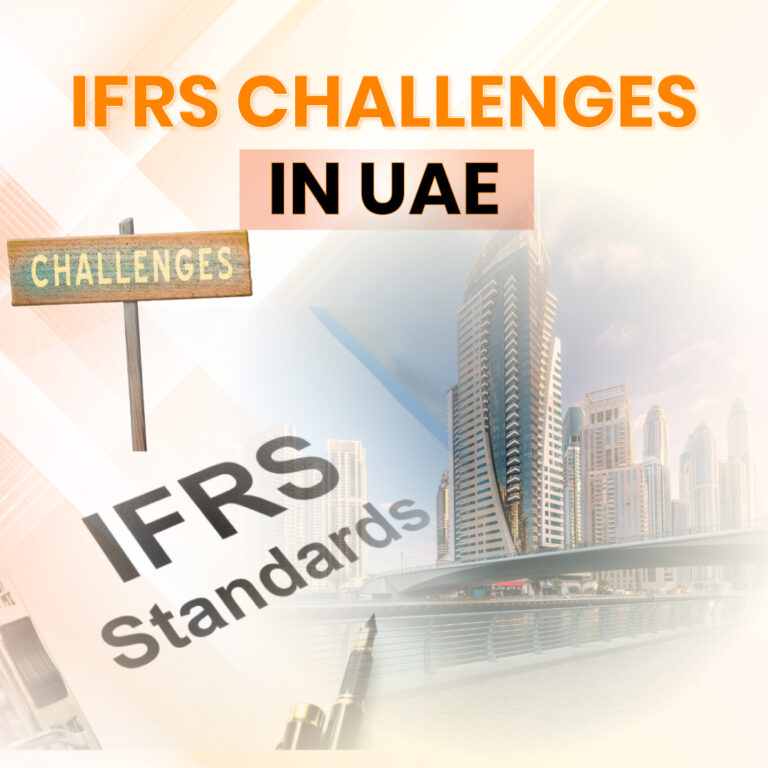“ARE UAE COMPANIES READY FOR THE NEW IFRS ERA AFTER COP28?”
As sustainability reporting has taken over the financial sectors worldwide and brought forward major changes, it has also tailored the old IFRS standards and introduced a polished version of international accounting standards. The newly introduced IFRS (International Financial Reporting Standards) are influenced by the sustainability factors. UAE, being a country where following IFRS is mandated for businesses, companies, and organizations, has accepted this new transformation and ensured that the new changes are adopted smoothly throughout the region.
Sustainability reporting, however, is majorly benefiting the climate by ensuring businesses report their climate impacts with transparency. But is it easy to apply these newly tailored standards in the UAE post-COP28? Absolutely not, there were quite a few IFRS challenges in the UAE that financial professionals and sectors have to face. In today’s blog, we are going to discuss the common IFRS challenges in the UAE faced by the financial sectors while complying with the newly introduced IFRS Sustainability Disclosure Standards (IFRS S1 & S2).
KEY IFRS CHALLENGES IN THE UAE POST COP28
COP28 was held in the UAE, Dubai; it was the 28th conference of the parties, where countries negotiated and discussed effective climate actions, the role of finance sectors in it, and other policies, as well as regulations related to the climate. After the great changes in IFRS in the UAE were introduced as Sustainability Disclosure Standards, some key challenges tagged along; some of them are discussed below:
1: DATA AVAILABILITY, QUALITY, & GRANULARITY
The new sustainability reporting standards IFRS S1 & S2 require in-depth sustainability data and climate metrics that companies are typically unable to provide because of the unavailability of strong systems that collect, identify, and audit such information accurately. Companies would rather collect data manually, which has more chances of errors, low-quality data, and weak controls; therefore, it is one of the top-most IFRS challenges in the UAE that requires work to be done upon it.
2: TECHNICAL COMPLEXITIES & SCENARIO ANALYSIS
IFRS S2 especially emphasizes scenario analysis, such as physical or technical risk and disclosure of transition plans; often, companies lack expertise to either do scenario analysis or to efficiently use it for financial reporting and decision-making to generate desired outcomes. It is difficult for companies to manage these technical complexities that they clearly are behind in.
3: CAPACITY AND SKILLS GAP
Usually, finance professionals lack the modernized or advanced skills and expertise to manage tasks related to climate science, risk modeling, assurance/audit of sustainability disclosures, etc. All these expertise are essential for sustainability reporting, hence, the financial sector in the UAE faces difficulty in executing their plan because of the lack of talent or required skillset in the finance professionals.
4: CROSS-FUNCTIONAL INTEGRATION & GOVERNANCE:
New sustainability factors are cross-functional, which means they not only require alignment of the finance department but also need operations, risk, ESG, etc, to be aligned with it. For this cross-functional integration, companies need really good governance, which is where they face challenges and difficulties.
5: REGULATORY UNCERTAINTY
While companies in the UAE are largely incorporating ISSB standards in their business practices, full endorsement or making it a compulsion keeps evolving, which makes it difficult for professionals and entities to plan their incorporation efficiently. This uncertainty in the region’s regulations adds to the IFRS challenges in the UAE.
CONCLUSION
For sure, IFRS sustainability disclosure standards, also known as IFRS S1 and S2, have influenced and tailored the financial sectors all across the world, especially countries like the UAE that emphasize compliance with international accounting standards. These changes, however, strengthen sustainable factors and have a positive impact on climate, but it is not as easy as it seems to adopt these newly issued standards; financial sectors have to face various IFRS implementation challenges in the UAE. Some of the common IFRS challenges in the UAE include a lack of sufficient data availability, capacity & skills gap, technical complexities, etc.
FREQUENTLY ASKED QUESTIONS (FAQs)
Q1: How does COP28 influence the IFRS implementation challenges in the UAE?
Ans: COP28 intensified the IFRS implementation challenges in the UAE, as after the 28th conference, there is an increased regulatory pressure, more investor expectations, and reputational risk; organizations and businesses are forced to keep up with the fast-evolving industry to sustain.
Q2: How does ACCA in the UAE support this new change of IFRS S1 & S2?
Ans The qualification of ACCA in the UAE has always been very supportive, especially when it comes to advancements in the financial sectors regarding modernized technologies or sustainable practices. It trains ACCA members and students with all the insights regarding the new changes, making them ready for the practical world.
Q3: What are the penalties for companies not complying with these standards?
Ans: Companies need to follow the sustainable reporting standards as stakeholders are now well-educated about it; non-compliance can raise questions and risk the company’s reputation. However, according to some sources, there is a penalty of around AED 2 million for non-compliant companies.





